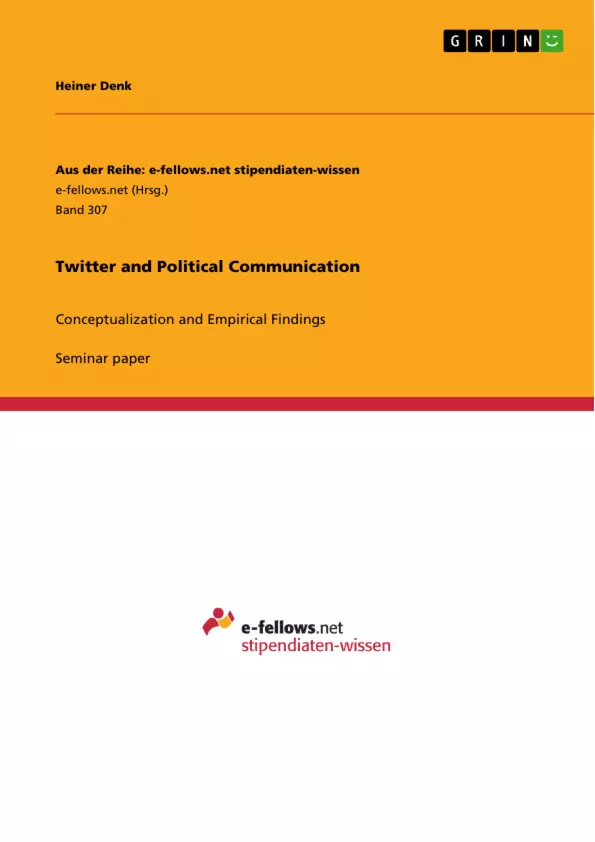What is Twitter being used for by German politicians? Can Twitter really bring the populace closer to the politicians? These are the central questions of the following paper. The key method in attempting to answer them is an analysis of the Twitter account of
Kristina Köhler, one of the most prominent German users of the online platform and the current federal Minister for families, senior citizens, women and the youth. The paper finds that increasing popularity of a politician decreases his activity on Twitter.
Inhaltsverzeichnis (Table of Contents)
- Introduction
- What is Twitter?
- Facts about Twitter
- Twitter, Campaigns and Political Communication
- Twitter and Political Campaigning in America
- Twitter and Political Campaigning in Germany
- Hypotheses about Twitter
- Kristina Köhler
- Methodology
- Results
- Conclusions
- Graphs & Tables
- Bibliography
Zielsetzung und Themenschwerpunkte (Objectives and Key Themes)
This paper aims to analyze the usage of Twitter by German politicians, particularly focusing on the account of Kristina Köhler, the Federal Minister for Families, Senior Citizens, Women and Youth. The paper explores the potential and actual relationship between Twitter and democracy, drawing comparisons with Barack Obama's 2008 presidential campaign. The analysis delves into the different ways Twitter is used by German politicians, assessing its role in political communication and its impact on the relationship between politicians and citizens.
- The role of Twitter in political communication
- The relationship between Twitter and democracy
- The use of Twitter by German politicians
- The impact of Twitter on the relationship between politicians and citizens
- The case study of Kristina Köhler's Twitter account
Zusammenfassung der Kapitel (Chapter Summaries)
The introduction sets the context by discussing the rise of Twitter in German politics and highlights its controversial nature. It then outlines the paper's objectives and its focus on Kristina Köhler's Twitter account as a case study.
The chapter "What is Twitter?" provides a detailed overview of the platform, explaining its features, functionalities, and different types of users. It emphasizes Twitter's unique features, particularly the 140-character limit and the focus on real-time communication.
The "Twitter, Campaigns and Political Communication" chapter explores the use of Twitter in political campaigns, both in the United States and in Germany. It examines the potential benefits and challenges of using Twitter for political communication.
The "Hypotheses about Twitter" chapter presents several hypotheses about the actual usage of Twitter by German politicians. These hypotheses will be tested in the analysis of Kristina Köhler's Twitter account.
Schlüsselwörter (Keywords)
This paper focuses on Twitter, political communication, democracy, social media, German politics, Kristina Köhler, case study, quantitative data, and Web 2.0.
Frequently Asked Questions
How do German politicians use Twitter?
German politicians use Twitter for political communication, campaigning, and to provide personal insights, though activity levels often vary depending on their public prominence.
What was found in the analysis of Kristina Köhler's Twitter account?
The study found that as a politician's popularity and official duties increase (e.g., becoming a federal minister), their direct activity and personal engagement on Twitter tend to decrease.
Can Twitter bring citizens closer to politicians?
While Twitter offers the potential for direct interaction and transparency, the actual usage often remains a one-way communication tool for broadcasting messages rather than deep dialogue.
What are the unique features of Twitter for political communication?
Key features include the 140-character limit (at the time of the study), real-time updates, and the ability to reach a wide audience quickly without traditional media filters.
How did Barack Obama influence the use of Twitter in politics?
Obama's 2008 campaign is cited as a pioneer in using social media for grassroots organizing and fundraising, serving as a model for politicians worldwide, including in Germany.
- Quote paper
- Heiner Denk (Author), 2010, Twitter and Political Communication, Munich, GRIN Verlag, https://www.grin.com/document/180704



